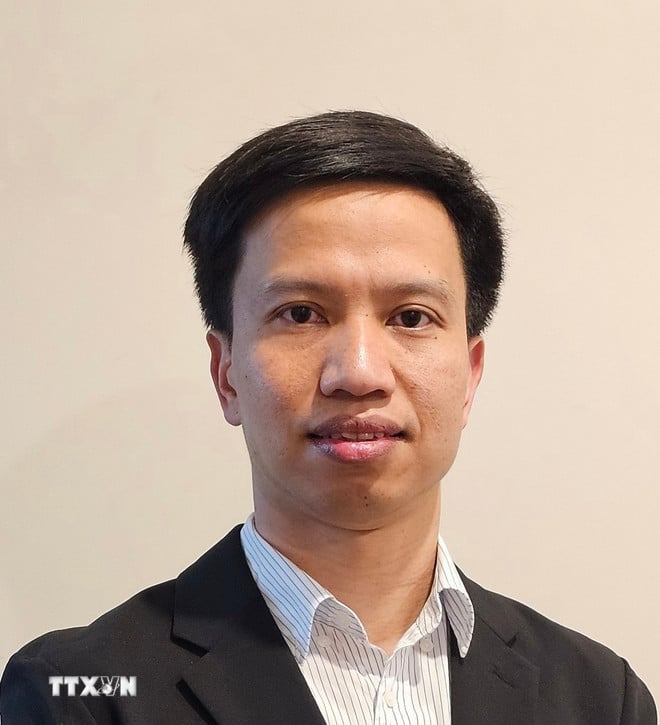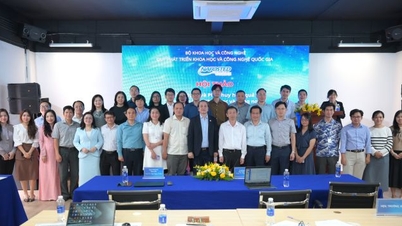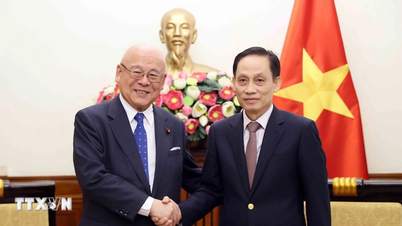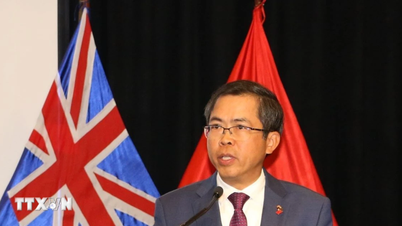"Cybercrime has become a pressing global issue and is growing faster than ever. Reports from numerous reputable and trustworthy organizations worldwide for 2025 have indicated that the damage caused by cybercrime is enormous."
This was shared by Associate Professor Dr. Pham Duc Son, a member of the Vietnam-Australia Intellectuals and Experts Association (VASEA), in an exchange with a VNA reporter in Australia on the occasion of the opening ceremony of the "United Nations Convention against Cybercrime" with the theme "Combating Cybercrime - Sharing Responsibility - Towards the Future," which will take place in Hanoi on October 25-26.
The importance of the Hanoi Convention
Associate Professor Dr. Pham Duc Son currently works at the Department of Electrical Engineering, Computer Science and Mathematical Sciences at Curtin University (Australia), and is also the President of the IEEE Computing Association's Western Australia branch.
According to Associate Professor Dr. Pham Duc Son, the World Economic Forum (WEF)'s "Global Cybersecurity Outlook 2025 Report" indicates that total losses from online fraud globally exceeded $1 trillion last year, with some countries suffering losses of more than 3% of their GDP due to cybercrime.
The US Federal Bureau of Investigation (FBI) reported losses of up to $12.5 billion due to cybercrime in the US in 2023. Meanwhile, IBM's 2025 Data Breach Costs report shows that the average loss caused by each data breach has reached $4.44 million worldwide.
Cybercriminals are becoming increasingly sophisticated, operating like businesses through a "cybercrime as a service" model, and increasingly using artificial intelligence (AI) to automate phishing, deepfake content creation, and data theft on a large scale.
International cooperation: The key to combating cybercrime.
Data extortion remains one of the most damaging threats, paralyzing hospitals, transportation systems, and many essential services globally.
Beyond financial losses, disruptions to operations, damage to reputation, and erosion of public trust are all very serious. Cybercrime is no longer just a technical issue, but an economic and national security problem, affecting every sector.
According to Associate Professor Dr. Pham Duc Son, the rapid "weaponization" of AI is changing the entire risk landscape. As human dependence on digital systems deepens, the need to enhance cybersecurity through practical actions and collaborations becomes more urgent than ever.
The message from all the major 2025 reports is clear: strengthening resilience to cybercrime is a shared responsibility. Governments, businesses, and individuals alike must bolster defenses and build trust in the digital world.

Associate Professor Dr. Pham Duc Son currently works at the Department of Electrical Engineering, Computer Science and Mathematical Sciences at Curtin University (Australia), and is also the President of the IEEE Computer Society branch in Western Australia. (Photo: VNA)
Assessing the advantages and disadvantages of international cooperation in combating cybercrime, Associate Professor Dr. Pham Duc Son stated that international cooperation is essential because cybercrime is a borderless issue.
Criminals often exploit jurisdictional gaps, operating from one country but targeting victims in another. Enhanced cooperation helps bridge these gaps by allowing law enforcement agencies to share intelligence, coordinate investigations, and prosecute crimes that may previously be hidden behind national borders.
International cooperation also helps strengthen collective resilience. When countries share information about emerging threats, attack patterns, and best practices, they can respond more quickly and prevent the spread of incidents globally.
For example, coordinated operations through Interpol or Europol have dismantled many large ransomware groups.
Another benefit is capacity building. Not all countries have the same level of technical or legal expertise, so international partnerships help enhance capacity through joint training, resource sharing, and expert mentoring. This strengthens the global cybersecurity ecosystem as a whole.
However, according to Associate Professor Dr. Pham Duc Son, the biggest challenge lies in the differences in laws and political systems.
Defining what constitutes cybercrime, how to handle electronic evidence, or privacy protection regulations can vary significantly between countries. These differences make joint investigations and extraditions complex and time-consuming.
Trust is also a barrier. Sharing intelligence often requires disclosing sensitive data about national systems, methods, or capabilities—something not all governments are willing to do. Geopolitical tensions can also limit the extent of open cooperation between countries.
Ultimately, coordination requires significant resources. Smaller countries may lack the manpower or funding to sustain long-term cooperation, and coordination across multiple agencies on borders can slow response times in emergencies.
Overall, Associate Professor Dr. Pham Duc Son believes that international cooperation is essential because cybercrime is transnational in nature, but also complex due to constraints related to sovereignty, law, and politics.
The most effective approach is to combine threat intelligence sharing, capacity-building programs, and a harmonized legal framework, such as the Budapest Convention on Cybercrime, while respecting national laws and data privacy rights.

Cybercrime has become a pressing global issue and is growing faster than ever. (Photo: VNA)
Having had the opportunity to participate in the 80th anniversary celebration of the United Nations, Associate Professor Dr. Pham Duc Son further recognized the importance of this organization in coordinating global efforts to address common challenges, and cybercrime is one of the most pressing challenges today.
Vietnam: Taking the lead and positioning its international role.
In the context of the upcoming signing ceremony of the United Nations Convention against Cybercrime, themed "Combating Cybercrime - Sharing Responsibility - Towards the Future," to be held in Hanoi on October 25-26, Associate Professor Dr. Pham Duc Son stated that the Convention is a vivid testament to that spirit of multilateral cooperation.
This is the first global legal framework coordinated by the United Nations to prevent, investigate, and prosecute cross-border cybercrime – a significant milestone opening a new chapter for international digital security.
The Budapest Convention on Cybercrime, initiated by the Council of Europe, has demonstrated the effectiveness of international cooperation in harmonizing laws and enhancing investigative capacity, particularly in the European region.
The Hanoi Convention inherits and elevates that success to a global scale, creating a universal and comprehensive platform for cooperation where all countries, regardless of their level of development, can cooperate, share intelligence, and agree on legal mechanisms for cross-border investigation and prosecution.
The convention's 24/7 cooperation mechanism will further enhance the world's ability to respond quickly to emerging cyber threats.
According to Associate Professor Dr. Pham Duc Son, at this particularly significant moment for the United Nations, the Hanoi Convention profoundly reflects the enduring values of the United Nations regarding cooperation, inclusiveness, and shared responsibility.
The Convention not only affirms the central role of the United Nations in coordinating global action but also lays the foundation for future frameworks on digital governance, artificial intelligence, and online safety.
In an interconnected world, this Convention demonstrates that collective action is humanity's strongest shield against cyber threats.
Associate Professor Dr. Pham Duc Son believes that Vietnam's selection as the host country for the signing ceremony of the "Hanoi Convention on Cybercrime Prevention and Control" is a strong recognition of Vietnam's increasingly high position and growing prestige in international cooperation, especially in the field of cybersecurity.
This reflects the international community's confidence in Vietnam's ability to act as a bridge between nations – a reliable, neutral country that remains steadfast in its commitment to peace, dialogue, and cooperation.
In recent years, Vietnam has hosted many important international events and welcomed world leaders, demonstrating that Vietnam is an active and responsible member of the international community.
Vietnam's consistent approach – "being a friend to all nations and a partner for peace" – is fully in line with the inclusive and cooperative spirit of the United Nations.
By hosting this historic event, Vietnam has demonstrated its leadership in promoting a safe, secure, and open digital future for all. The event also underscores Vietnam's growing influence in shaping global digital governance.
Vietnam is not only a participant, but also a facilitator of international consensus, helping countries to jointly address one of the most complex challenges of our time: cybercrime.

(Photo: Vietnam+)
In many respects, the "Hanoi Convention" will bear the name of Vietnam as a symbol of peace, trust, and shared responsibility in the digital age.
Experiences and prospects from developed countries
Sharing Australia's experience in ensuring cybersecurity, Associate Professor Dr. Pham Duc Son stated that Australia has built a solid and proactive foundation in cybersecurity, guided by the Australian Cybersecurity Strategy 2023-2030, issued by the Government at the end of 2023.
This strategy is a national plan to build a safe and resilient Australia against cyber threats by 2030, with six key “cybersecurity shields,” ranging from strengthening the protection of critical infrastructure and combating cybercrime, to promoting international cooperation and enhancing community resilience. The ultimate goal is to make Australia the world’s leading cybersecurity nation by 2030.
At the heart of Australia’s operational capabilities is the Australian Signals Directorate (ASD), which plays a key role in protecting national networks and providing timely information and recommendations to the government, businesses, and the public.
Through the Australian Cyber Security Centre (ACSC), a division of the ASD, Australians receive alerts, guidance, and support when incidents occur.
The ASD's 2024-2025 Annual Cyber Threat Report shows that the number of reported cybercrime incidents has increased to over 84,000 over the past year, with average losses per incident exceeding AUD 36,000, demonstrating that vigilance and cooperation remain key factors.
Furthermore, Australia encourages organizations to adopt the “Eight Measures for Cybersecurity Risk Reduction,” which significantly reduces the likelihood and extent of damage from attacks. The Australian government is also investing heavily in enhancing the security of digital systems, developing human resources capacity, and increasing public awareness of cybersecurity.
Like many other countries, Australia is facing an increasingly complex cyber threat landscape, but through a coordinated national strategy, strong public-private partnerships, and proactive international cooperation, Australia is striving to ensure a safe, reliable, and sustainable cyberspace for all its citizens.
(VNA/Vietnam+)
Source: https://www.vietnamplus.vn/cong-uoc-ha-noi-bieu-tuong-cua-hoa-binh-va-trach-nhiem-chung-trong-ky-nguyen-so-post1072323.vnp




![[Photo] Closing Ceremony of the 10th Session of the 15th National Assembly](/_next/image?url=https%3A%2F%2Fvphoto.vietnam.vn%2Fthumb%2F1200x675%2Fvietnam%2Fresource%2FIMAGE%2F2025%2F12%2F11%2F1765448959967_image-1437-jpg.webp&w=3840&q=75)


![[Photo] Prime Minister Pham Minh Chinh holds a phone call with the CEO of Russia's Rosatom Corporation.](/_next/image?url=https%3A%2F%2Fvphoto.vietnam.vn%2Fthumb%2F1200x675%2Fvietnam%2Fresource%2FIMAGE%2F2025%2F12%2F11%2F1765464552365_dsc-5295-jpg.webp&w=3840&q=75)
















































![[OFFICIAL] MISA GROUP ANNOUNCES ITS PIONEERING BRAND POSITIONING IN BUILDING AGENTIC AI FOR BUSINESSES, HOUSEHOLDS, AND THE GOVERNMENT](https://vphoto.vietnam.vn/thumb/402x226/vietnam/resource/IMAGE/2025/12/11/1765444754256_agentic-ai_postfb-scaled.png)



















































Comment (0)